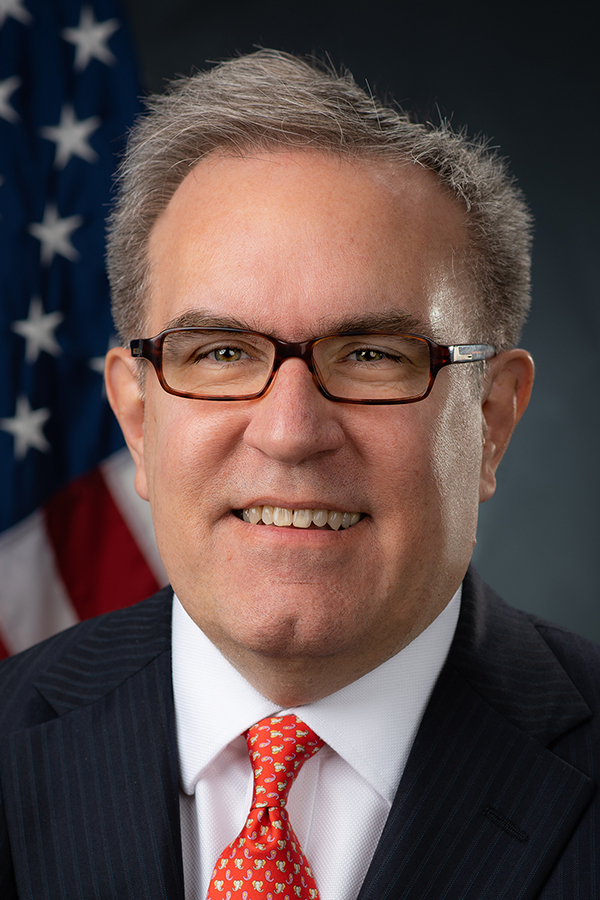
How many more will die from climate change, Mr. Wheeler, before you see it as a crisis?
Andrew Wheeler has to be challenged every step of the way to stop his pro-fossil fuel, pro-Trump agenda at the Environmental Protection Agency.

C: USEPA by Eric Vance
At his confirmation hearing to lead the US Environmental Protection Agency, the nominee, Andrew Wheeler, an ex-coal lobbyist, said he considers he would “not call” climate change “the greatest crisis” facing humanity.
Wheeler is up for the top job, after his predecessor, climate denier, Scott Pruitt, was forced to resign after a series of scandals.
At the hearing, Wheeler did begrudgingly concede climate change was a “huge issue that has to be addressed globally,” and contrary to his new boss, it was not a hoax. “I have not used the hoax word myself,” Wheeler said.
But you cannot take coal out of a former coal lobbyist. At the hearing he “touted rolling back pollution standards”, according to the Guardian and reconfirmed that he was committed to implementing the President’s “regulatory reform agenda”. So that effectively means no action on climate change.
As Wheeler spoke, protesters shouted: “Shut down Wheeler, not the EPA.”
Wheeler said he was still examining the US Government report on climate change which was published in November last year; which was subsequently dismissed by Trump. Firstly, Wheeler should have already read the report by the time of the hearing and secondly, the problem for Wheeler is that every day he dithers or denies the evidence, people die.
A new report in the New England Journal of Medicine suggests rising global temperatures could lead to many more deaths than predicted by the World Health Organization just five years ago.
It states: “Climate change is already adversely affecting human health and health systems, and projected climate change is expected to alter the geographic range and burden of a variety of climate-sensitive health outcomes and to affect the functioning of public health and health care systems.”
And in a warning to the likes of Andrew Wheeler, the scientists note: “If no additional actions are taken, then over the coming decades, substantial increases in morbidity and mortality are expected in association with a range of health outcomes, including heat-related illnesses, illnesses caused by poor air quality, undernutrition from reduced food quality and security, and selected vectorborne diseases in some locations; at the same time, worker productivity is expected to decrease, particularly at low latitudes”.
The scientists continue that deaths from climate change that have been estimated so far are likely to be an understimate: “The World Health Organization (WHO) estimated that approximately 250,000 deaths annually between 2030 and 2050 could be due to climate change–related increases in heat exposure in elderly people, as well as increases in diarrheal disease, malaria, dengue, coastal flooding, and childhood stunting.”
However the scientists warn that “This is a conservative estimate, because it does not include deaths from other climate-sensitive health outcomes and does not include morbidity or the effects associated with the disruption of health services from extreme weather and climate events.”
For example, they conclude that “a climate change–associated net increase of 529,000 adult deaths worldwide was projected to result from expected reductions in food availability (particularly fruit and vegetables) by 2050, as compared with a reference scenario without climate change.”
Furthermore, the World Bank estimates that, if not tackled, climate change could force more than 100 million people into extreme poverty by 2030, too.
In direct contrast to Wheeler, one of the author’s of the report, Professor Andy Haines, a British epidemiologist and former director of the London School of Hygiene & Tropical Medicine, stated that climate change is the “most important environmental threat facing humanity.”
Haines told CNN: “Future generations will, no doubt, look back at the missed opportunities for progress towards a healthy, sustainable economy and question why decisive action wasn’t taken sooner.”
Also this week, a new study released by Oil Change International and 17 partner organizations maked it crystal clear that if we are going to have reduced carbon emissions, then we are going to have to have a rapid and equitable decline of U.S. fossil fuel production.
The analysis shows the scale of the disconnect: the United States is set to drive nearly 60 percent of global growth in oil and gas supply between now and 2030; whereas the Intergovernmental Panel on Climate Change (IPCC)’s recent Special Report on 1.5°C of Global Warming warns that the world needs to cut carbon emissions nearly in half by 2030 to keep warming within that limit.
As my colleague, Kelly Trout explained: “Real climate leadership requires decisively saying ‘no’ to further expansion of the fossil fuel industry while enthusiastically saying ‘yes’ to a renewable energy transition on the pace and scale of a Green New Deal.”
So the question is why are you not showing real climate leadership and taking decisive action now Mr. Wheeler? How many more have to die, before you see climate change as the true crisis it is? Wheeler has to be challenged every step of the way to stop his pro-fossil fuel, pro-Trump agenda.
As a linked article in this month’s New England Journal also notes: “The financial interests of organizations vested in the fossil fuel industry, a federal administration that disavows climate science and its own responsibility to act, and inertia are powerful countervailing forces. Changing our institutions and society will therefore require concerted, organized, and forceful efforts.”
